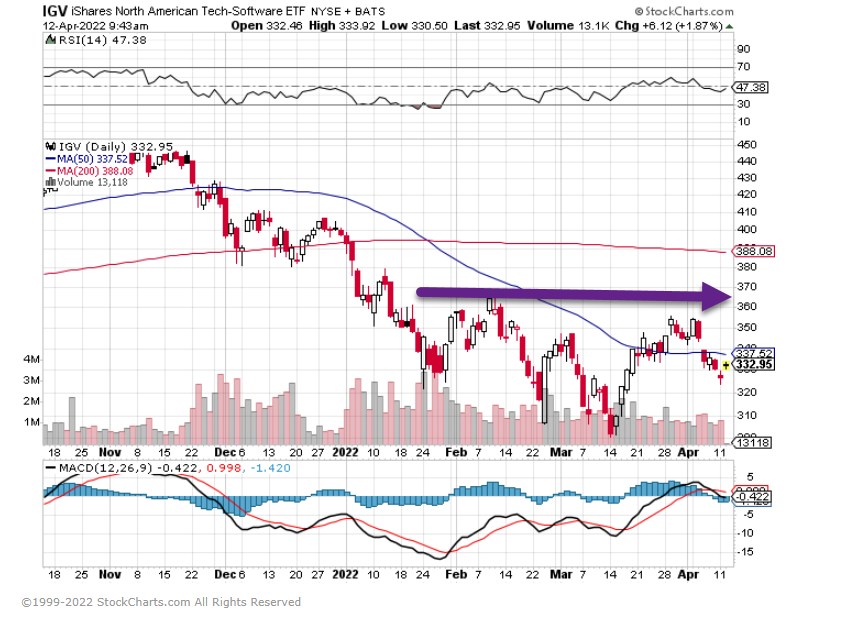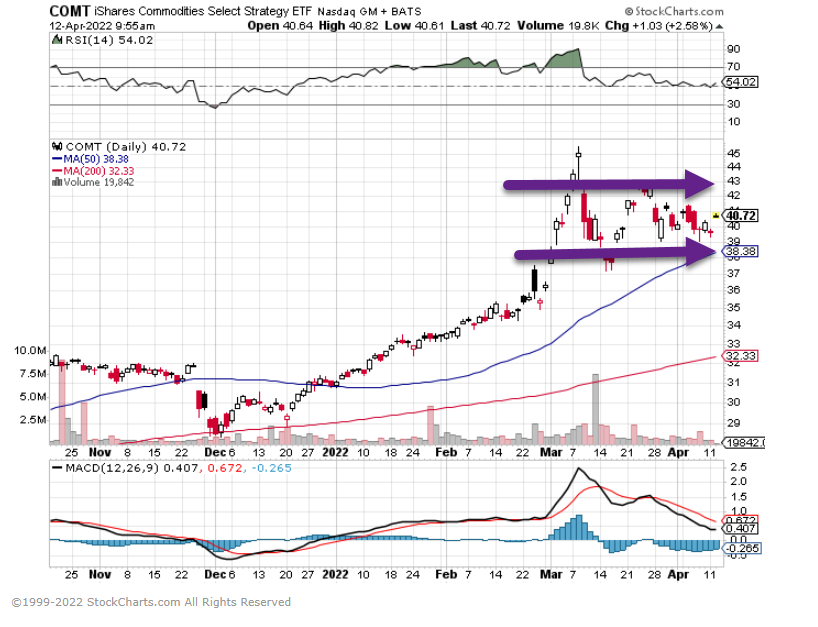1. The Last 14 Years 91% Correlation Between Fed’s Balance Sheet and S&P
Fed has started process of unraveling the balance sheet

Barrons-All of Fed Choir Finally Is Singing From the Same Anti-Inflation HymnalRandall W. ForsythFollow https://www.barrons.com/
2. Software ETF Still -27% from Highs.
Software ETF multiple rallies in last 3 months have failed

3. Contra Indicator? The Share of Investors Expecting the Economy to Deteriorate is the Highest Ever
From Dave Lutz at Jones Trading–GLOOMY– Global growth optimism has sunk to an all-time low, with recession fears surging in the world’s investment community, according to the latest BofA fund manager survey – Fund managers expect the Fed to hike seven times this year, up from four times in last month’s survey, and the tightening cycle to end in April 2023. Investors are very long cash, commodities, healthcare and energy, and materials while they shun bonds, discretionary and euro-area stocks The share of investors expecting the economy to deteriorate is the highest ever, according to the April survey. Stagflation expectations jumped to the highest since August 2008, while monetary risk increased to a historic high, BofA strategists said, after surveying 292 panelists with $833 billion in assets under management in the first week of April.

4. Commodities in a Sideways Holding Pattern
Commodities sideways on possible recessions and China lock-down

5. Crypto not Holding Up to “Digital Gold” Title…..Bitcoin 90day Correlation to Nasdaq 100 Hits New High
The Daily Shot Blog Cryptocurrency: In the crypto-sphere, Bitcoin’s 90-day correlation with the Nasdaq 100 reached a new high, which comes as Bitcoin fell through the bottom end of its 50-day moving average.

Source: CoinDesk, Koylin Read full article
https://dailyshotbrief.com/
6. Inflation-Car and Meat Prices can Revert to the Mean without Recession
LPL Research


7. Housing Holds Up Well During Inflation and Rising Rates
Ben Carlson Blog-Plus housing has held up well historically when mortgage rates rise, especially during periods of high inflation:

https://awealthofcommonsense.com/2022/04/is-the-fed-is-making-a-mistake/
8. This US airport has reclaimed its title as the world’s busiest-CNN
Marnie Hunter, CNN
US airports dominated the passenger traffic rankings in 2021, with eight of the top 10 in the United States.
World’s top 10 busiest airports for passenger traffic in 2021
1. Atlanta (ATL): 75.7 million passengers, up 76% from 2020
2. Dallas/Fort Worth (DFW): 62.5 million passengers, up 59% from 2020
3. Denver (DEN): 58.8 million passengers, up 74% from 2020
4. Chicago O’Hare (ORD): 54 million passengers, up 75% from 2020
5. Los Angeles (LAX): 48 million passengers, up 67% from 2020
6. Charlotte (CLT): 43.3 million passengers, up 59% from 2020
7. Orlando (MCO): 40.4 million passengers, up 87% from 2020
8. Guangzhou (CAN): 40.3 million passengers, down 8% from 2020
9. Chengdu (CTU): 40.1 million passengers, down 1.5% from 2020
10. Las Vegas (LAS): 39.8 million passengers, up 79% from 2020
World’s busiest airports in 2021: Atlanta reclaims title | CNN Travel
9. Carjackings in Chicago +204% 2019 to 2021
Carjackings rose only 34 percent in Chicago from 2010 to 2019 but skyrocketed 204 percent from 2019 to 1,836 in 2021.

https://www.zerohedge.com/political/stunning-rise-chicago-carjackings-leaves-lawmakers-scrambling
10. How to Increase Your Self-Control
Barriers to patience and ways of overcoming them.
Posted April 12, 2022 | Reviewed by Ekua Hagan
THE BASICS
KEY POINTS
- Two barriers to waiting for “larger-later rewards” (rather than “smaller-sooner rewards”) are the lack of ability and the lack of desire to wait.
- Techniques to increase the ability to wait include distraction, reframing, putting oneself in a positive mood, and using reminders.
- Techniques that strengthen the desire to wait include exaggerating a delayed reward’s value and waiting before choosing.
Suppose you are told you can have either two marshmallows now or four later. Which do you choose? (Or replace “marshmallows” with a more attractive reward, like “a million dollars!”). No matter what the reward, the choice is between a smaller-sooner reward and a larger-later one.
So, how to decide? More generally, how do you decide whether to obtain what you desire presently or make sacrifices for something better in the future—like saving for retirement, or for a nice vacation, car, or home?
The answer depends on both your ability and desire to exercise self-control, argues a recent paper by Roberts and Fishbach, published in the April issue of Trends in Cognitive Sciences.
The paper, which reviews research on how to increase both the ability to wait and the desire to wait, is summarized below.
Increasing the ability to wait
To increase the ability to wait and improve patience, you need to make it easier to be patient. How? Here are some suggestions:
1. Distract yourself. If you are sitting by the phone waiting for a call, for example, turn on the TV, listen to music, or find other ways of entertaining and distracting yourself.
2. Do not make big decisions in a need state (e.g., feeling thirsty, exhausted, in pain). For instance, do not shop for food when hungry or respond to a critical email when tired. Otherwise, you may find it very difficult to resist whatever is immediately rewarding (e.g., buying junk food, sending a vicious response to the critical email).
3. Pre-commit to being patient. In other words, long before you are faced with temptations, make the decision to wait for the larger-later reward.
4. Use reminders for the steps you must take to receive the larger reward. Without reminders and a plan, it becomes tempting to choose an immediate option just to have closure (e.g., doing your Christmas shopping now just to cross it off the list instead of waiting and buying better gifts when the desired items go on sale).
5. Put yourself in a positive mood. Research shows it is easier to be patient when you are happy than sad.
6. Reframe the thing you are waiting for in a way that reduces its emotional appeal. While waiting for, say, hot chocolate, reframe it as a black liquid—not a hot, sweet, creamy, and rich drink.
article continues after advertisement
Increasing the desire to wait
To improve patience by increasing the desire to wait, find ways to make waiting worth it. How? Consider these:
1. Wait before making a choice (“wait-to-choose technique”). For instance, looking over a restaurant menu at home may increase your appreciation for dishes that usually take longer to prepare (i.e. larger-later reward). Note, the wait-to-choose technique differs from Number 3 in the previous section; specifically, the current strategy introduces extra time before, not after, one has made a choice.
2. Increase your level of certainty and trust, the belief that you will receive the larger reward if you are patient. This is important because as the wait becomes longer, uncertainty naturally increases.
3. Improve the personal connection to your future self—the self who will benefit from your patience (be it in 10 days or 10 years). A stronger psychological connection to this future self increases motivation to, say, study hard and finish college or save money for retirement.
4. Change how the options are framed, so the delayed outcome appears more valuable. For example, another way of saying you could have “$10 now or $20 later” is to say you could have “$10 now and $0 later, or $0 now and $20 later.” When options are framed in the second way, people are often more willing to wait.
Concluding thoughts on the importance of self-control and patience
Willpower and self-control are associated with a variety of positive outcomes, such as improved health, better relationships, and greater success in achieving goals.
It is usually assumed the ability to self-control is what matters the most in making good decisions—in choosing between a smaller-sooner and a larger-later reward. We assume: If people can wait, they will.
In reality, however, it is difficult to be patient if the waited-for-object is not considered valuable or desired.
The difference between desire and ability to self-control is important because so often in life we are faced with difficult choices between a smaller-sooner and a larger-later reward. Some examples are:
· Choosing a medical treatment that works immediately but is less effective overall, or an intervention that may take longer to work but is more effective.
· Getting a low-paying job now, or focusing on your studies for the next few years to get a better job after you graduate.
· Going on your usual summer vacation next week, or saving money for a couple of years to go on your dream vacation and travel the world.
Regardless of the options you are faced with, to increase patience, you must analyze the situation and find what is preventing you from exercising self-control.
The research reviewed showed self-control and patience may require, in some situations, the ability to wait, and in others, the desire to wait. And as we discussed, there are techniques to improve self-control in both situations.
In summary, if you cannot wait, this means self-control is difficult. So, make it easier by using the six techniques listed above, such as distraction or reframing.
If you can but do not want to, then waiting does not appear to be worth it. Solution? Make waiting more rewarding by using one of the four strategies described, like using the wait-to-choose technique or increasing your certainty about eventually receiving the reward.
https://www.psychologytoday.